- cross-posted to:
- fuck_ai
- cross-posted to:
- fuck_ai
Companies are going all-in on artificial intelligence right now, investing millions or even billions into the area while slapping the AI initialism on their products, even when doing so seems strange and pointless.
Heavy investment and increasingly powerful hardware tend to mean more expensive products. To discover if people would be willing to pay extra for hardware with AI capabilities, the question was asked on the TechPowerUp forums.
The results show that over 22,000 people, a massive 84% of the overall vote, said no, they would not pay more. More than 2,200 participants said they didn’t know, while just under 2,000 voters said yes.



I honestly have no Idea what AI does to a processor, and would therefore not pay extra for the badge.
If it provided a significant speed improvement or something, then yeah, sure. Nobody has really communicated to me what the benefit is. It all seems like hand waving.
what they mean is that they are putting in dedicated processors or other hardware just to run an LLM . it doesnt speed up anything other than the faux-AI tool they are implementing.
LLMs require a ton of math that is better suited to video processors than the general purpose cpu on most machines.
Parallel processing capability. CPUs historically worked with mostly-non-massively-parallelizable tasks; maybe you’d use a GPU if you wanted that.
I mean, that’s not necessarily “AI” as such, but LLMs are a neat application that uses them.
On-CPU video acceleration does parallel processing too.
Software’s going to have to parallelize if it wants to get much by way of performance improvements, anyway. We haven’t been seeing rapid exponential growth in serial computation speed since the early 2000s. But we can get more parallel compute capacity.